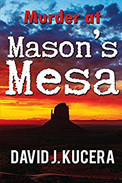
 |
The protagonist of this novel, Dr. Charles Quincy Kruse, is an esteemed archaeology professor conducting research at a dig site with other professors and students when things start going awry: first a water leak, then a fire, and eventually murder, drugs, and money, not necessarily in that order. This murder mystery novel is much more than just that, however. Sometimes waxing poetic (the mark of a professional writer), and full of twists that readers don't anticipate, this is a novel not soon to be forgotten. Weeks after finishing it, readers might still be wondering whether this author had a lesson or message in mind when writing his book, or just an extremely riveting story rattling around that had to come out. Is Dr. Kruse the quintessential "noble scholar" whom the author wishes we would all emulate, showing perseverance and altruism, or is he simply a talented, tenacious, and inquisitive character in an intriguing book? "He found that teaching and coaching provided him with rewards...just as fulfilling as playing baseball. Teaching and coaching were not as financially rewarding as professional baseball, but money had never been Dr. Kruse's motive for playing sports."
Entertaining from start to finish, our good guy, Kruse, is everything that most people want to be: intelligent, handsome, employed, responsible, and equipped with a sound moral compass and the guts to back it up. He is a methodical-thinking professor, taking his role as mentor and responsible party for his summer fieldwork students to heart. The other characters are well-rounded and realistic, but some are craftily written into the story as a tempting cast of red herrings, while the real bad guys are woven into the story subtly, like a play where characters are looming in the background, sans spotlights, and silhouetted. Finally, as if murder, money, greed, politics, and academia aren't enough in a novel, the love story is believable and unpredictable, too. Come to find out, there is more intrigue in this love story than in the murder plot.
Stylistically, Kucera is clearly a talented writer. If you attended a field study course in college, the scene is instantly recognizable as you read about the students arriving at their 3-month camp, complete with mess tent and the cordoned off excavation site. If you have ever sat in a class where college papers were handed out and feedback solicited, you know the scene well when Krucera describes that university setting perfectly. Any readers who've been part of a tight-knit sports team, (baseball, in Kruse's case, but the sport doesn't matter), will relate to the scene Kucera sets at the end of the season: "The bonds between the ballplayers had become stronger than those of mere teammates or close friends; they were like the bonds between family members. To concede that the season was really over was comparable to saying their family was breaking up."
The ending of this book is a shocker. Did the author mean for it to be a "choose your own," or did he intend for readers to face a philosophical question? Was he asking readers to ponder whether everyone has a price, or was he just leaving us jolted and impressed with the imaginative ending to this exquisite story? Some of the cliff hangers may leave readers annoyed, but this is a minor irritant in an otherwise excellent book. Book groups would do well to snatch up this novel. The questions are many and the answers regarding what the author intended are few. In short, this novel just leaves us with a lot to think about.
RECOMMENDED by the US Review